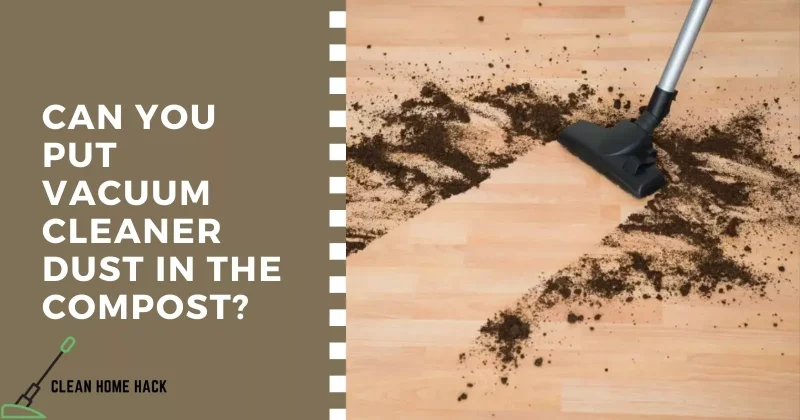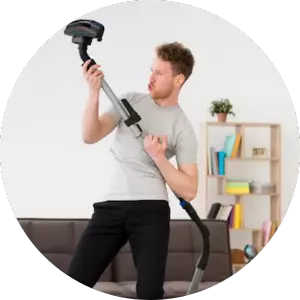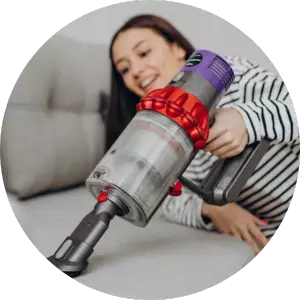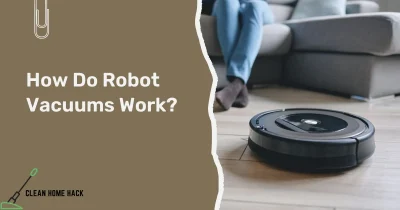Can You Put Vacuum Cleaner Dust in The Compost?

 The Short Answer is: The Short Answer is: |
| No, you should not put vacuum cleaner dust in the compost. Vacuum cleaner dust may contain harmful chemicals and inorganic materials, making it unsuitable for composting. While the organic materials picked up by the vacuum cleaner can be composted, the synthetic fibers present in the dust cannot be easily broken down by microorganisms and bacteria. It is best to dispose of vacuum cleaner dust in the garbage, double bagging and tying it before throwing it away. |
Can You Put Vacuum Cleaner Dust in The Compost? This is a question that many people ask when they are trying to reduce their waste and create compost for their gardens.
While some sources say that vacuum cleaner dust can be composted, others say that it should not be added to the compost pile.
In this article, we will explore the different opinions on this topic and provide you with the information you need to make an informed decision about whether or not to compost your vacuum cleaner dust.
Table of Contents
Understanding the Composition of Vacuum Cleaner Dust
Vacuum cleaner dust is a complex mixture of organic and inorganic materials, including dust, dirt, hair, skin cells, and microorganisms.
Recent studies have shown that vacuum cleaner dust can contain harmful chemicals and allergens, including bacteria and mold that can cause adverse effects in allergic people, infants, and people with compromised immunity.
While the organic materials picked up by the vacuum cleaner can be composted, the synthetic fibers present in the dust cannot be easily broken down by microorganisms and bacteria. Therefore, it is not recommended to compost vacuum cleaner dust. Instead, it should be disposed of as garbage.
Pros and Cons of Composting Vacuum Cleaner Dust
Composting vacuum cleaner dust can have both pros and cons. Here are some points to consider:
Pros of composting vacuum cleaner dust:
1. Organic Materials: The organic materials picked up by the vacuum cleaner, such as dust, dirt, and hair, can be composted. These materials can contribute to the nutrient content of the compost and improve soil fertility.
2. Reduced Waste: Composting vacuum cleaner dust allows you to divert waste from the landfill and contribute to a more sustainable waste management system.
Cons of composting vacuum cleaner dust:
1. Synthetic Fibers: Vacuum cleaner dust often contains synthetic fibers, bits of plastic packaging, and other non-compostable materials. These materials will not break down easily in the compost and can potentially contaminate the final product.
2. Harmful Chemicals: Vacuum cleaner dust can contain harmful chemicals and inorganic materials. Composting these materials can introduce toxins into the compost and potentially harm plants or the environment.
3. Microorganisms and Bacteria: While the organic materials in vacuum cleaner dust can be broken down by microorganisms and bacteria, the presence of synthetic fibers and other non-compostable materials may hinder the composting process.
While composting the organic materials in vacuum cleaner dust can be beneficial, the presence of synthetic fibers and potential contaminants make it generally not recommended to compost vacuum cleaner dust. It is best to dispose of it as garbage.
Types of Vacuum Cleaner Dust Suitable for Composting
While vacuum cleaner dust is generally not recommended for composting due to the presence of synthetic fibers and potential contaminants, there are some types of vacuum cleaner dust that may be suitable for composting.
Here are some examples:
1. Pet Hair and Fur: If you have pets, the hair and fur they shed can be composted. These materials are organic and will break down easily in the compost.
2. Natural Fibers: If your vacuum cleaner picks up natural fibers, such as cotton or wool, these materials can be composted. Natural fibers are organic and will break down easily in the compost.
3. Food Scraps: If you use your vacuum cleaner to pick up food scraps, such as crumbs or vegetable peelings, these materials can be composted. Food scraps are organic and will contribute to the nutrient content of the compost.
4. Garden Waste: If you use your vacuum cleaner to pick up garden waste, such as leaves or grass clippings, these materials can be composted. Garden waste is organic and will contribute to the nutrient content of the compost.
It is important to note that even if you are composting suitable types of vacuum cleaner dust, it is still recommended to separate them from other compostable materials and compost them separately. This will help prevent potential contamination and ensure that the final product is safe for use in the garden.
Precautions Before Adding Dust to Your Compost
Before adding vacuum cleaner dust to your compost, it is important to take some precautions to ensure that the final product is safe and healthy for your plants. Here are some things to keep in mind:
1. Separate Suitable Dust: If you have determined that the vacuum cleaner dust you have is suitable for composting, it is important to separate it from other compostable materials and compost it separately. This will help prevent potential contamination and ensure that the final product is safe for use in the garden.
2. Avoid Synthetic Fibers: Vacuum cleaner dust often contains synthetic fibers, bits of plastic packaging, and other non-compostable materials. These materials will not break down easily in the compost and can potentially contaminate the final product. Therefore, it is important to avoid adding vacuum cleaner dust that contains synthetic fibers to your compost.
3. Double Bagging: If you are disposing of vacuum cleaner dust as garbage, it is recommended to double bag and tie the dust and powders before putting them in the trash.
4. Avoid Harmful Chemicals: Vacuum cleaner dust can contain harmful chemicals and inorganic materials. Therefore, it is important to avoid adding vacuum cleaner dust that contains harmful chemicals to your compost.
Before adding vacuum cleaner dust to your compost, it is important to separate suitable dust, avoid synthetic fibers and harmful chemicals, and double bag the dust if disposed of it as garbage. By taking these precautions, you can ensure that your compost is safe and healthy for your plants.
Step-by-Step Guide to Composting Vacuum Cleaner Dust
Here is a step-by-step guide to composting vacuum cleaner dust:
Step 1: Thoroughly Vacuum Your House
Start by thoroughly vacuuming your house. Make sure to get all the nooks and crannies.
Step 2: Separate Suitable Dust
If you have determined that the vacuum cleaner dust you have is suitable for composting, it is important to separate it from other compostable materials and compost it separately. This will help prevent potential contamination and ensure that the final product is safe for use in the garden.
Step 3: Avoid Synthetic Fibers
Vacuum cleaner dust often contains synthetic fibers, bits of plastic packaging, and other non-compostable materials.
These materials will not break down easily in the compost and can potentially contaminate the final product. Therefore, it is important to avoid adding vacuum cleaner dust that contains synthetic fibers to your compost.
Step 4: Double Bagging:
If you are disposing of vacuum cleaner dust as garbage, it is recommended to double bag and tie the dust and powders before putting them in the trash.
Step 5: Add Suitable Dust to Compost:
If you have suitable vacuum cleaner dust, add it to your compost pile. Make sure to mix it well with other compostable materials, such as food scraps, garden waste, and leaves.
Step 6: Monitor Compost:
Monitor your compost pile regularly to ensure that it is breaking down properly. If you notice any issues, such as a foul odor or slow decomposition, adjust the compost pile accordingly.
Composting vacuum cleaner dust requires separating suitable dust, avoiding synthetic fibers, double bagging if disposing of it as garbage, and adding it to your compost pile. By following these steps, you can ensure that your compost is safe and healthy for your plants.
Using Compost-Containing Vacuum Dust in Your Garden
Composting vacuum cleaner dust can be a sustainable way to dispose of the organic materials picked up by the vacuum cleaner. However, it is important to note that vacuum cleaner dust often contains synthetic fibers, bits of plastic packaging, and other non-compostable materials.
Therefore, it is recommended to compost only the suitable vacuum cleaner dust that is free of synthetic fibers and other contaminants. Here are some tips for using compost-containing vacuum dust in your garden:
1. Use in Moderation: While compost is a great way to improve soil fertility, it is important to use it in moderation. Too much compost can lead to nutrient imbalances and other issues.
2. Mix with Soil: Before using compost-containing vacuum dust in your garden, mix it well with soil. This will help ensure that the nutrients are evenly distributed and that the compost is fully integrated into the soil.
3. Avoid Contaminants: If you are unsure about the quality of your compost-containing vacuum dust, it is best to avoid using it in your garden. Contaminants in the compost can potentially harm your plants and the environment.
Compost-containing vacuum dust can be a great way to improve soil fertility in your garden. However, it is important to use it in moderation, mix it with soil, and avoid contaminants. By following these tips, you can ensure that your garden is healthy and thriving.
Alternatives to Composting for Vacuum Cleaner Dust Disposal
If you have vacuum cleaner dust that is not suitable for composting, there are several alternatives for disposal. Here are some options:
1. Garbage Disposal: If your vacuum cleaner dust contains synthetic fibers, plastic packaging, or other non-compostable materials, it is best to dispose of it as garbage. Double bag and tie the dust and powders before putting them in the trash.
2. Recycling: While vacuum cleaner dust cannot be recycled, some vacuum cleaner manufacturers offer recycling programs for their products. Check with the manufacturer to see if they offer a recycling program for your vacuum cleaner.
3. Reuse: If you have a lot of vacuum cleaner dust, you can reuse it for other purposes, such as cleaning up spills or filling in small holes in your yard.
4. Composting: If you have suitable vacuum cleaner dust that is free of synthetic fibers and other contaminants, you can compost it. However, it is important to compost it separately from other compostable materials and monitor the compost pile regularly.
If you have vacuum cleaner dust that is not suitable for composting, you can dispose of it as garbage, recycle your vacuum cleaner, reuse it for other purposes, or compost it if it is suitable.
By choosing the right disposal method, you can ensure that your vacuum cleaner dust is disposed of safely and sustainably.
Frequently Asked Questions Related to the Topic:
Can vacuum dirt go in compost?
Yes, vacuum dirt can go into the compost, but it depends on the material it is made of. If the vacuum lint is made of organic fabric waste, it can be composted.
However, regular vacuum lint is usually a combination of dust, hair, and synthetic fibers, which may not be suitable for composting.
Some compost bin manufacturers advise against putting vacuum cleaner lint and dust in the compost due to the potential for contamination. Therefore, it is recommended to check the material of the vacuum dirt before adding it to the compost.
What do you do with vacuum dust?
Vacuum dust can be handled in a few different ways, depending on your needs. Here are some options:
1. Compost it: If you have a compost pile, you can add vacuum dust to it as long as it doesn’t contain any toxic materials.
2. Vacuum it up: When you’re cleaning your home, it’s best to dust first and then vacuum. This way, any dust that escapes during dusting will settle on the floor and can be easily vacuumed up.
3. Dispose of it: If you don’t want to compost or vacuum up your dust, you can simply throw it away in the trash.
It’s worth noting that if you have a lot of dust in your home, it may be a sign that you need to clean your home more thoroughly or address any underlying issues that are causing the dust buildup.
Additionally, it’s important to clean your vacuum regularly to ensure that it’s working effectively and not spreading dust around your home.
Where do you put vacuum dust?
When vacuuming, it is best to dust first and then use the vacuum. This is because dust particles will disperse into the air and then fall down, so working your way down will help you ensure that you get as much of it as possible.
Vacuuming after dusting will allow you to pick up any dust that may have settled on the floor. It is important to note that vacuum dust should not be put in the compost.
Does dust make good compost?
Yes, sawdust (which is a type of dust) can make good compost. However, it is important to note that pure, uncomposted sawdust is not good for soil since it will tie up nitrogen, making it unavailable for plants. To use sawdust in compost, it should be added in an approximately 4:1 ratio of brown to green materials.
Sawdust makes a perfect amendment for compost piles as it adds a filler that is somewhat absorptive and will pick up water from rain and juices from the green material, helping along in the composting process.
Conclusion on Can You Put Vacuum Cleaner Dust in The Compost
In conclusion, while vacuum cleaner dust may contain organic materials that are suitable for composting, it is generally not recommended to add it to your compost pile. Vacuum cleaner dust often contains synthetic fibers, bits of plastic packaging, and other non-compostable materials that can contaminate the final product.
If you have suitable vacuum cleaner dust that is free of contaminants, it is important to compost it separately from other compostable materials and monitor the compost pile regularly.
However, if your vacuum cleaner dust contains synthetic fibers or other non-compostable materials, it is best to dispose of it as garbage, recycle your vacuum cleaner, reuse it for other purposes, or compost it if it is suitable.
By choosing the right disposal method, you can ensure that your vacuum cleaner dust is disposed of safely and sustainably.







